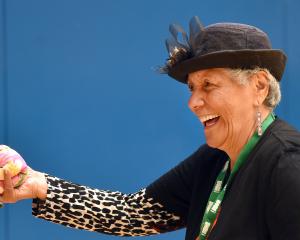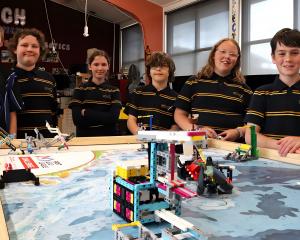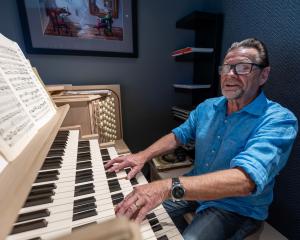About 15 protesters surrounded Ms Stanford as she made her way through the Ministry of Education building, chanting "shame" and "blood on your hands" and "grant the visas" as she entered the building.
Protester Oscar Bartle said the government’s lack of action in helping support those who have family in Palestine affected by the war was "gutless".
He hoped the campaign would eventually prove successful, although he had his doubts about this government listening.
In May, the Dunedin City Council passed a motion calling on Ms Stanford to urgently establish a special visa for family members of the New Zealand Palestinian community affected by the war in Gaza and "make every diplomatic effort to ensure safe passage for these family members out of the war zone".

Ms Stanford replied to the letter later that month, acknowledging the suffering experienced by the people of Palestine, but said at this stage they were not looking at providing a special visa pathway.
Protester Patrick Gibbons said yesterday it did not make sense that the government would issue special visas for Ukrainian refugees, but not those from Palestine.
"It’s double standards."
Ms Stanford said yesterday in a statement the humanitarian situation in Gaza was incredibly difficult.
"I acknowledge these are very challenging circumstances for people and their family in New Zealand."
In mid-May, she took an oral item to Cabinet to provide an update on immigration matters in relation to Gaza.
"The view of Cabinet at that time was to retain current visa settings ... Any decision on changing current visa settings is a decision for Cabinet."
Ms Stanford said the government was "maintaining an open mind", and officials were monitoring the situation closely.
"All decisions taken in relation to New Zealand’s response to international conflicts are context dependent and are decisions for Cabinet.
"Our current focus, led by the Minister of Foreign Affairs, is on providing funding for humanitarian support and using our voice to support the release of Israeli hostages and a ceasefire."
She was also in Dunedin in her capacity as education minister.
She visited George Street Normal School, gave a speech to the Otago Primary School Principals’ Association at the Edgar Centre and met researchers for The Dunedin Study.
Association president Kim Blackwood said Ms Stanford’s talk about the government’s education agenda was "well received".












